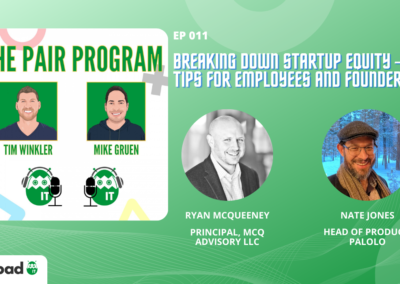Ever considered joining a tech startup?
If so, you’re not alone. Many engineers and product managers prefer startups over corporate jobs.
To be fair, there are a lot of perks – from flexible hours to the excitement of building something from scratch.
In this article, we’ve rounded up 10 of the best software startups to work for and outline their tech stack, product, financial standing (and much more!).
These companies range in size, from 19 employees to over 500. We’ve ordered them from smallest to largest.
The bonus? They’re all hiring technologists (engineering, data, and product). And they all offer remote work. If you find your fit, go right ahead and submit your application below.
Happy job search!
1. Palolo
- Company Size: 1-25
- Tech Stack: Typescript/React/Express/Postgres/AWS
- Industry: Fintech
- Year Founded: 2019
- Funding: Seed Stage
What are they building? The team at Palolo believes that banks for working Americans can be so much more. They’re imagining and building a bank that actually feels exciting to talk about because it actually puts workers first. What does that mean? It means building a bank that gives workers actual credit for the work they do. They’re giving out zero-interest loans through a partnership with select employers. This covers flat tires, broken iPhones, life stuff. What’s next? More tangible products that solve everyday problems and help you plan for the future. Like getting your pay every day. Or employer-matched savings. All powered by zero-fee bank accounts. The team at Palolo can’t wait to unleash the future!
How does their tech leadership encourage professional growth? The Head of Engineering, Frankie Nicoletti is passionate about helping engineers build satisfying careers in the startup space. Check out her article, How to Build Your Own Career Path at a Tech Startup (In 4 Simple Steps).

Want to join the team? Check out their open roles.
2. Picnic
- Company Size: 25-50
- Industry: Cybersecurity
- Year Founded: 2019
- Funding: Series A, $14M
What are they building? Picnic is a cybersecurity firm that proactively protects people and companies from the biggest threat vector in cyber today: attacks by social engineers. Social engineers are hackers who use public information to craft attacks that include phishing scams, ransomware, impersonation, identity theft, malware, elder fraud, and many others. Picnic finds and removes the information about businesses and people that can be harvested by social engineers. Their technology works proactively, automatically, seamlessly, and continuously to protect their users. This is next-generation security—security at the human level.
Who leads the engineering team? Mike Hans, VP of Engineering, has established his career in the cybersecurity space. His background includes several cybersecurity startups where he has mentored and scaled the engineering teams. In this interview, Mike reveals why Picnic operated in stealth mode while building their product and customer base.
Want to join the team? Check out their open roles.
3. Pryon
- Company Size: 25-50
- Tech Stack: AWS, Docker, Go, Node.JS, Python
- Industry: Artificial Intelligence
- Year Founded: 2017
- Funding: Series A, $37M
What are they building? The team at Pryon is building AI technology that improves the accuracy of chatbots and support agents. Customers and employees are demanding higher and higher levels of self-service experiences (think call centers, virtual assistants and chat), which require sophisticated natural language interactions that today’s chatbots and knowledge management systems can’t deliver. Pryon automates the AI model-building process, so companies can benefit from supercharged knowledge management. Their technology impacts countless industries – from automotive to healthcare.
How was the company founded? Pryon was founded by Igor Jablokov, whose previous company was acquired by Amazon in 2011 for its AI tech — which is now found in billions of Alexa, Echo, and Fire TV devices. Catch this interview with Igor Jablokov as he shares the story behind Pryon:
Want to join the team? Fill out this form and we’ll be in touch!
4. Sitka
- Company Size: 25-50
- Tech Stack:
- Infrastructure: AWS/Docker/Postgres
- Backend: Python with SQLAlchemy and some Node.js, Thrift for RPC
- Frontend: React with Typescript
- Industry: Healthtech
- Year Founded: 2017
- Funding: Series A, $22.2M
What are they building? Sitka’s platform connects primary care physicians (PCP’s) to Board-Certified Specialists through consults via video and text. Their technology empowers PCP’s to own more patient care by directly consulting with Specialists versus referring patients out. This cuts back on burden to patient and enables PCP’s to have visibility into the totality of their patient care.
What’s it like to be on their engineering team? Watch Josh Glazer, Software Engineer, share about why he joined Sitka and what’ it’s like to be on the team.
Want to join the team? Fill out this form and we’ll be in touch!
5. Rize
- Company Size: 50-75
- Tech Stack: AWS, Docker, React Native, Redux, Ruby on Rails, Snowflake Typescript
- Industry: Fintech
- Year Founded: 2015
- Funding: $13.4M, Series A
What are they building? The team at Rize is building the banking platform of the future — one that unifies spending, saving, and investing in ways current banks can’t. They’ve built a truly differentiated product capable of independently managing multiple pools of money across different account types. Rize is the only truly full-stack banking as a service platform that combines all the banking, processing, and compliance capabilities into one API-driven platform, so a fintech builder can get to market faster, with less effort and better economics.
How are they building a diverse workplace?

Want to join the team? Fill out this form and we’ll be in touch!
6. Kevel
- Company Size: 75-100
- Tech Stack: AWS, Clojure
- Industry: AdTech
- Year Founded: 2010
- Funding: 22.2M, Series B
What are they building? Kevel offers the infrastructure APIs needed to quickly build custom ad platforms. Their team is committed to the vision that every online retailer and publisher should be able to add privacy-focused ad revenue streams and take back the Internet from Google, Amazon, Facebook, and other digital monopolies. Their customers include Ticketmaster, Yelp, Strava, and Mozilla. Watch this video about their product.
How does their tech leadership encourage professional growth? The VP of Product, Tushar Kirtane, is passionate about helping product team members grow in their career. Check out this interview where he shares about stepping into management as a product professional: From Doer to Manager: The Shift from Managing Products to Managing PM’s
Want to join the team? Check out their open roles.
7. Federated Wireless
- Company Size: 100-125
- Tech Stack: C++, Python
- Industry: Wireless Services
- Year Founded: 2012
- Funding: $205.7M, Series D
What are they building? As the telecom leader in providing spectrum, the team at Federated Wireless is disrupting the mobile communications industry. They’re on a mission to provide innovation and services that connect people, businesses and industries to the future. How? From private networks like stadiums or casinos to large mobile and cable networks, shared spectrum is forecast to be a billion dollar market in five years, and Federated Wireless is one of only a handful of companies with a solution for managing access to the spectrum. Find out more about their private wireless and fixed wireless technologies.
What is it like to be part of the team?

Take a Risk, Take Ownership, Have Fun. Federated Wireless fosters a work culture that supports its employees in solving tough technical and business problems. Employees can expect a lot of growth, change, and challenges, which keeps the job exciting. It’s expected for employees to be creative, resourceful, and curious. The company doesn’t emphasize job titles, rather it encourages autonomy and collaboration. And there’s no reason you can’t have fun while doing so. Celebration among colleagues is encouraged, whether for diverse holidays or personal accomplishments.
Want to join the team? Fill out this form and we’ll be in touch!
8. JupiterOne
- Company Size: 125-150
- Tech Stack: AWS, Node.JS, Python, React, Terraform, Typescript
- Industry: Cybersecurity
- Year Founded: 2018
- Funding: $119M, Series C
What are they building? JupiterOne was built around the notion that complexity is the enemy of security operations and assurance. To combat complexity, organizations need centralized visibility of assets and resources from all of their different platforms, mapping relationships and measuring changes in their environment in a single, searchable repository. Trusted by industry leaders like Reddit, Databricks, Auth0, and Addepar, JupiterOne is the first software cloud-native security and compliance platform built on a graph data model. It enables companies to create and manage their entire security process from policy creation to operating a secure cloud infrastructure.
How do the technical teams collaborate? We interviewed Anne Nielsen, Executive Director of Product Development, about how she is building a mature product organization across their engineering, data, and product teams.
Want to join the team? Fill out this form and we’ll be in touch!
9. IronNet
- Company Size: 325-350
- Tech Stack: AWS, C++, Go, Kubernetes, Python
- Industry: Cybersecurity
- Year Founded: 2014
- Funding: $410.5M, Post-IPO Equity
What are they building? IronNet delivers unmatched collective cyber threat detection for enterprise on-premise, cloud, and hybrid networks. They’re the cybersecurity solution for big enterprise and cloud networks designed to catch threats that other tools won’t even see. They serve everyone from the defense industry to financial services, healthcare, and energy.
Their core product, IronDefense, is an advanced network behavior analysis platform. It gives businesses and governments a massively-scalable Network Traffic Analysis platform, real-time threat sharing solution, and intuitive dashboard. IronDome is their industry-leading Threat Detection and collaboration platform. This collective defense solution links IronDefense instances across peers within a supply-chain, industry, or region and enables security teams to share insights and work together in real-time.
What’s it like to be on their engineering team? Watch Beth Wilson, Software Development Engineer, what she’s learned since joining IronNet and what’ it’s like to be on the team.
Want to join the team? Fill out this form and we’ll be in touch!
10. Morning Consult
- Company Size: 500-525
- Tech Stack: Go, JavaScript, Node.JS, React, Typescript
- Industry: Decision Intelligence
- Year Founded: 2014
- Funding: $91M, Series B
What are they building? Morning Consult’s brand management platform collects survey research data from 15 countries to analyze alongside social media, news, and economic data to guide every strategic decision that organizations need to make. At the core of its survey research is a rigorous scientific methodology, regularly cited in top news outlets.
How does the technical team work together? In this interview Associate VP, Platform Engineering, Kara Chapman, shares how the team keeps learning and growing together.
Bonus: We interviewed Senior Software Engineer, Rob Liebowitz, about doing code reviews. In his article, 15 Best Practices for a Successful Code Review, he shares tips he’s learned from being part of the team at Morning Consult.
Want to join the team? Fill out this form and we’ll be in touch!





